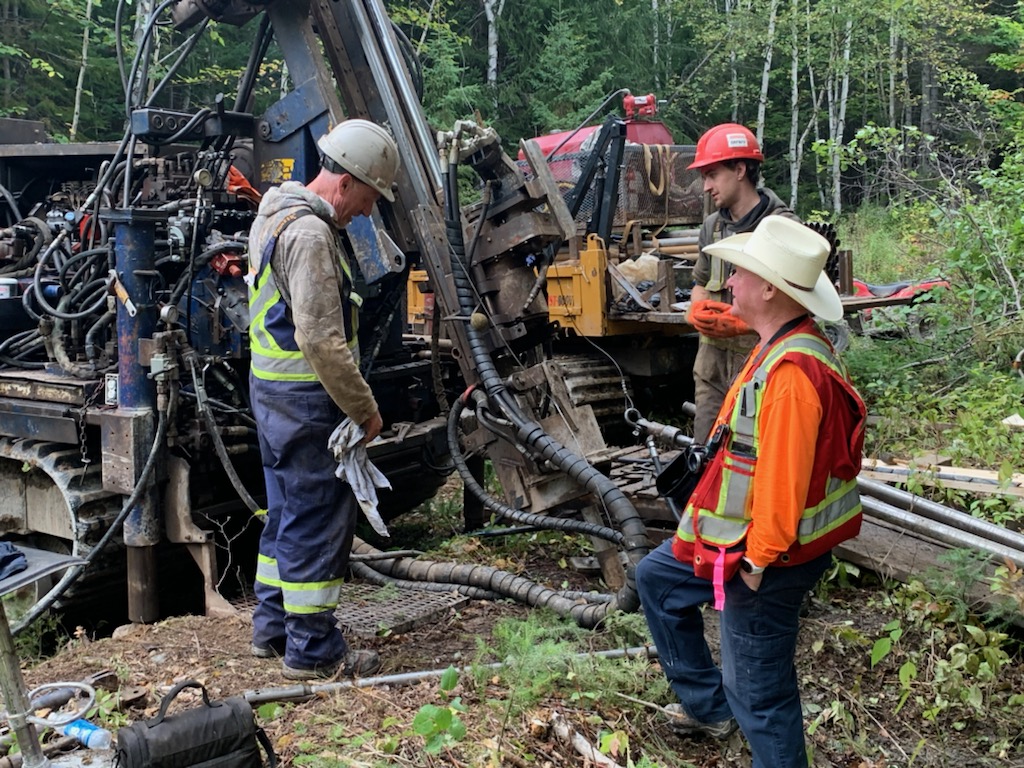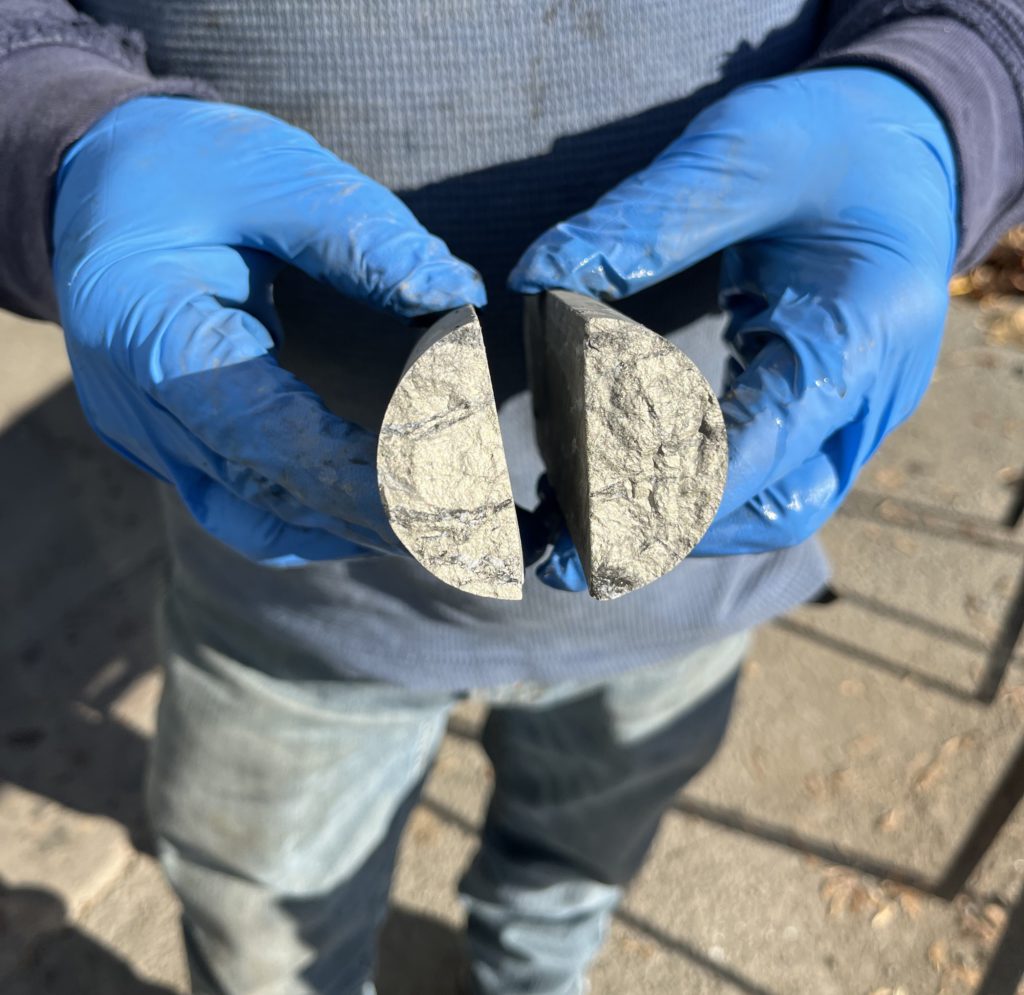JV Article: Nine Mile Metals advances projects with ‘five-star’ locations in Bathurst Mining Camp


Nine Mile Metals’ (CSE: NINE; US-OTC: VMSXF) flagship Nine Mile Brook critical minerals project in northern New Brunswick sits in the heart of the Bathurst Mining Camp, a circular area of about 70 km in diameter in the province’s Miramichi Highlands.
The BMC hosts 46 known deposits (25 with reserves over 1 million tonnes) and another 100 mineral occurrences, according to the province’s Ministry of Natural Resources and Energy Development, and it has been the focal point of exploration since the 1950s, when two massive base metal deposits – No. 6 and No. 12 – were discovered.
The Vancouver-based junior’s Nine Mile Brook project is 10 km southwest of the Brunswick No. 12 lead-zinc-copper mine, which operated for 49 years until it closed in 2013, and still ranks as one of the largest underground zinc mines in the world. Nine Mile Brook also lies just 13 km from the Brunswick No. 6 copper-lead-zinc mine, which was in production from 1966 until 1983.

“This is the third largest mining camp in the world and the government and us both believe from the geology and geophysics that only 30% of its deposits have been discovered and there is a larger one than the Brunswick 12 waiting to be discovered,” says CEO Patrick Cruickshank. “You can see spatial deposits almost every 10 km.”
Nine Mile Brook and the company’s two other projects, Canoe Landing Lake and California Lake, 8 and 10 km to the west, respectively, are all in “five-star locations,” he says. “Our projects are in the mineralized folded saddle in the camp and very little work has been done there. No one wanted to explore there because it’s so complex.”
One of the reasons it’s such a difficult environment is that five episodes of structural deformation have been identified, rock units are near vertical and there’s less than 1% outcrop in the camp. “The deposits are twisting and folding, and you can drill 100 holes and not hit anything.”
Technology and analytical advancements are making exploration more accessible, however. Nine Mile Metals is working with EarthEx Geophysical Solutions to accelerate targeting using close-spaced UAV drone magnetics and proprietary algorithm processing along with artificial intelligence (AI) target extraction processes.
“Every 20 years or so there is a breakthrough in new geophysical technology – magnetics, gravity, VTEM and so on – and the latest is UAV high-definition magnetics with proprietary processing algorithms and AI machine learning,” Cruickshank says, adding that the results of the company’s last two drill programs prove that statement true.
At Nine Mile Brook, results from the first drill program “are the richest copper results in the history of the mining camp,” he says. Drill hole NM22003 intersected 10.5 metres of 6.92% copper, 5.6% zinc, 2.52% lead, 179.28 g/t silver, and 1.33 g/t gold starting from surface. Drill hole NM220004 returned 15.1 metres grading 10.12% copper, 1% zinc, 1.41% lead, 91.47 g/t silver, and 0.84 g/t gold from surface; and drill hole NM220005 cut 11 metres grading 9.59% copper, 11.93% zinc, 2.90% lead, 283.31 g/t silver and 1.65 g/t gold.
For the second phase program, the company chose targets based on results from phase 1 and EarthEx’s UAV drone technology with 3D magnetic modelling defining subsurface geological structures. The survey identified potential structural mineralized folds in the system with details visible to a depth of up to 1 km.
In addition to the magnetometer, the drone is equipped with a LiDAR (light detection and ranging) laser imaging system that provides real-time data for collision avoidance, allowing the drone to fly as low as possible. A magnetic base station is also established to continually collect data and identify diurnal changes in the magnetics.
Nine Mile Metals is now drilling its second-phase, 5,000-metre program, which will target 18 individual geophysical anomalies at Nine Mile Brook.
At its California Lake project, the initial stage 1 drill program was completed in November. The 1,226-metre program included eight shallow holes collared to intersect VMS mineralization along a 1.5-km, late-time conductance electromagnetic anomaly defined by EarthEx. Seven of the holes intersected multiple VMS horizons within a sheared sedimentary package.
“That’s unheard of in a first pass,” Cruickshank says. “Usually, you are happy to have one hole clip any mineralization on an initial shallow program. We actually drilled seven of eight holes with multiple VMS zones.”
This first-pass program was based on an initial re-processing of public MegaTEM datasets by EarthEX and overlaying late-time conductive responses utilized by their algorithms’ analysis. “We didn’t even fly the drone, that’s how good the technology is just to process the data, and this summer we will do a complete phase two at California Lake, fly the drone, and then come back with a 5,000- to 10,000-metre drill program on the high-end targets and we’ll do the same at Canoe Lake,” he says. “We have definition no one has ever seen before, it’s pretty incredible, and provides us with an excellent exploration road map.”
The preceding Joint Venture Article is PROMOTED CONTENT sponsored by Nine Mile Metals, and produced in co-operation with The Northern Miner. Visit www.ninemilemetals.com for more information.
Comments
Georges Jr Bernier
With all these discoveries, witch deposit will be the first one to be in operation and, will it be all open pit or underground oparation?